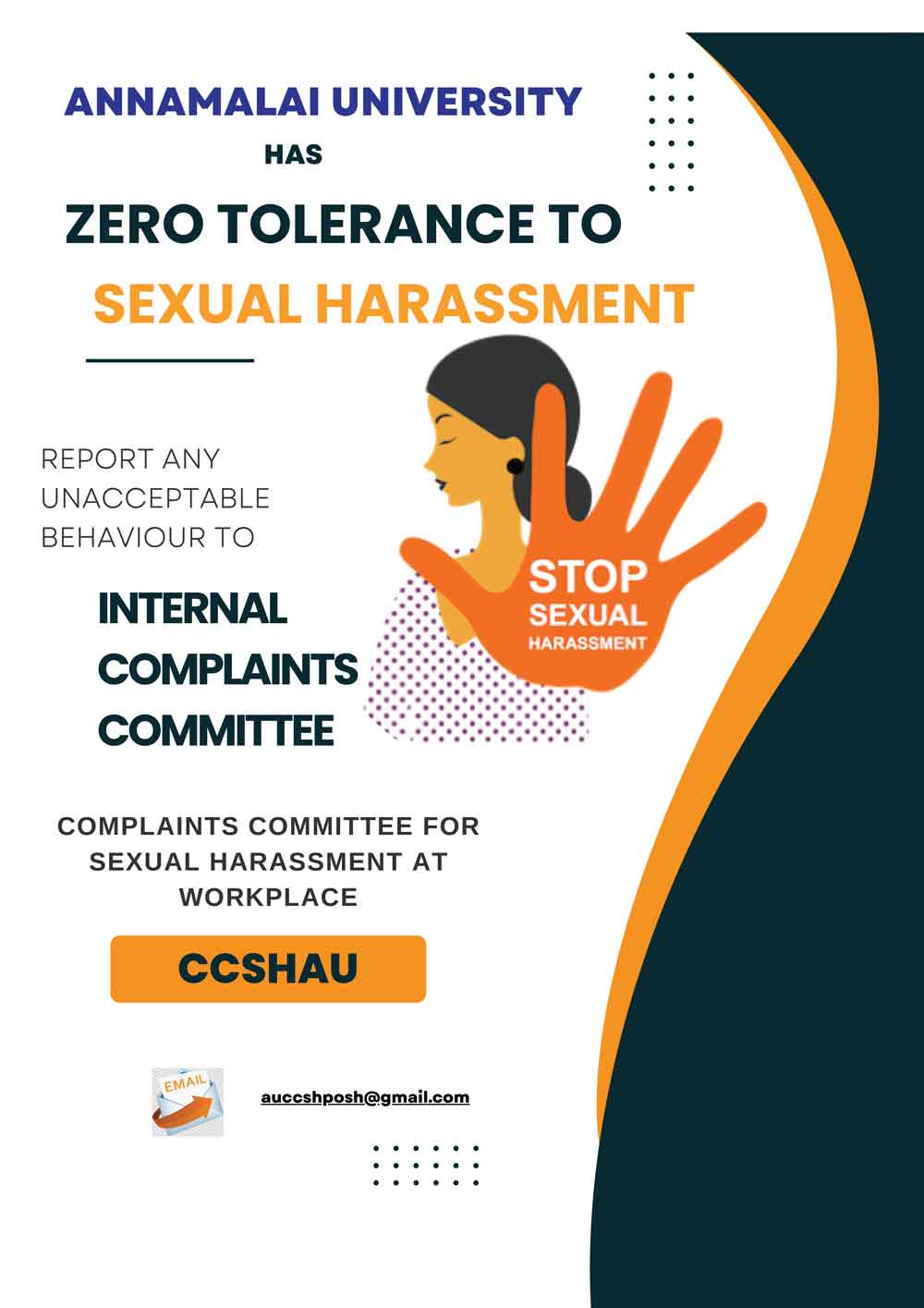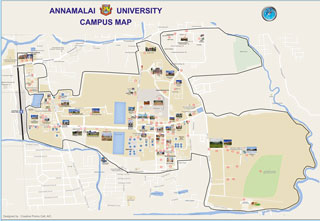Home > Student Support > COMPLAINTS COMMITTEE AGAINST SEXUAL HARASSMENT AT WORKPLACE


- COMPLAINTS COMMITTEE : Annamalai University has constituted an Internal “Complaints Committee” at the university level and shall be called Complaints Committee against Sexual Harassment Annamalai University (CCSHAU). This Complaints Committee has the powers of civil courts for gathering evidence. The Complaints Committee is required to provide for conciliation before initiating an inquiry, if requested by the complainant. This Committee will complete the inquiry within a time period of 90 days. On completion of the inquiry, the report will be sent to Annamalai University, the university will take action on the report within 60 days.
- COMPLAINT : Any aggrieved woman may make, in writing, a complaint of sexual harassment at workplace to the CCSHAU, within a period of three months from the date of incident and in case of a series of incidents, within a period of three months from the date of last incident.
- If the aggrieved woman is not capable of writing the complaint, the Chair person or any Member of the CCSHAU, shall render all reasonable assistance to the woman for making the complaint in writing.
- Further it is also provided that the CCSHAU may, for the reasons to be recorded in writing, extend the time limit not exceeding three months, if it is convinced that the circumstances were such which prevented the woman from filing a complaint within the said period.
- Where the aggrieved woman is unable to make a complaint on account of her physical or mental incapacity or death or otherwise, her legal heir may make a complaint.
- CONCILIATION : The CCSHAU before initiating an inquiry and at the request of the aggrieved woman will take steps to settle the matter between her and the respondent through conciliation:
- Provided that no monetary settlement shall be made as a basis of conciliation.
- Where a settlement has been arrived the CCSHAU shall record the settlement so arrived and forward the same to the authorities of Annamalai University to take action as specified in the recommendation.
- The CCSHAU shall provide the copies of the settlement as recorded to the aggrieved woman and the respondent.
- Where a settlement is arrived no further inquiry shall be conducted by the CCSHAU.
- INQUIRY OF COMPLAINTS : The CCSHAU shall make inquiry into the complaint in accordance with the provisions of the service rules / code of conduct of Annamalai University.
- The CCSHAU shall, if prima faciecase exist, forward the complaint to the police, within a period of seven days for registering the case under section 509 of the Indian Penal Code (Word, gesture or act intended to insult the modesty of a woman), and any other relevant provisions of the said Code where applicable.
- Also if any term or condition of the settlement arrived at conciliation has not been complied with by the respondent, the CCSHAU shall proceed to make an inquiry into the complaint or, as the case may be, forward the complaint to the police.
- Both the parties shall, during the course of inquiry, be given an opportunity of being heard and a copy of the findings shall be made available to both the parties enabling them to make representation against the findings before the CCSHAU.
- For the purpose of making an inquiry CCSHAU will have the same powers as are vested in a civil court (under the Code of Civil Procedure, 1908) on the following matters, namely:—
- Summoning and enforcing the attendance of any person and examining him on oath;
- Requiring the discovery and production of documents; and
- The inquiry shall be completed within a period of ninety days.
- During the pendency of an inquiry, on a written request made by the aggrieved woman, the CCSHAU may recommend to the Authorities of Annamalai Unversity to
- Transfer the aggrieved woman or the respondent to any other workplace; or
- Grant leave to the aggrieved woman upto a period of three months; or
- The leave granted to the aggrieved woman under this section shall be in addition to the leave she would be otherwise entitled.
- INQUIRY REPORT : On the completion of an inquiry under this Act, the CCSHAU will provide a report of its findings to the Authorities of Annamalai University, within a period of ten days from the date of completion of the inquiry and such report be made available to the concerned parties.
- When the CCSHAU arrives at the conclusion that the allegation against the respondent has not been proved, it shall recommend to the Authorities of Annamalai University that no action is required to be taken in the matter.
- When the CCSHAU arrives at the conclusion that the allegation against the respondent has been proved, it will recommend to the Authorities of Annamalai University
- To take action for sexual harassment as a misconduct in accordance with the provisions of the service rules / code of conduct of Annamalai University.
- Warning, reprimand, or censure
- Transfers
- Cut in Increments (Maximum of One increment)
- Suspension
- Termination from the services of the Annamalai University
- To deduct from the salary or wages of the respondent such sum as it may consider appropriate to be paid to the aggrieved woman or to her legal heirs, as it may determine, in accordance with:
- The mental trauma, pain, suffering and emotional distress caused to the aggrieved woman; the loss in the career opportunity due to the incident of sexual harassment; medical expenses incurred by the victim for physical or psychiatric treatment; the income and financial status of the respondent; feasibility of such payment in lump sum or in installments.
- If such deductions cannot be made due to his being absent from duty or cessation of employment it may direct to the respondent to pay such sum to the aggrieved woman.
- Penalties in case of Students:
- Warning or reprimand.
- Transfer to another hostel.
- Withdrawal of hostel accommodation for a period up to one semester.
- Withdrawal of the right to an official conduct certificate from the University.
- Withdrawal of hostel accommodation for the entire period of study.
- Rustication from the University for a period up to two semesters.
- Expulsion from the University, and/or a bar on appearing for the entrance examination/interview to any programme of study offered by the University.
- Withholding of a degree awarded by the University.
- PUNISHMENT FOR FALSE COMPLAINTS: When the CCSHAU arrives at a conclusion that the allegation against a person is malicious or the aggrieved woman or any other person making the complaint has made the complaint knowing it to be false or the aggrieved woman or any other person making the complaint has produced any forged or misleading document, it may recommend to the Authorities of Annamalai University to take action against the woman or the person who has made the complaint, in accordance with the provisions of the service rules / code of conduct as applicable to her or him. A mere inability to substantiate a complaint or provide adequate proof need not attract action against the complainant.
- If the CCSHAU arrives at a conclusion that during the inquiry any witness has given false evidence or produced any forged or misleading document, it may recommend to the Authorities of Annamalai University to take action in accordance with the provisions of the service rules / code of conduct as applicable to the said witness.
- INFORMATION PROTECTION: No matter what is contained in the Right to Information Act, 2005, the contents of the complaint, the identity and addresses of the aggrieved woman, respondent and witnesses, any information relating to conciliation and inquiry proceedings, recommendations of the CCSHAU and the action taken by the Authorities of Annamalai University under the provisions of this Act will not be published, communicated or made known to the public, press and media in any manner.
- The information may be disseminated regarding the justice secured to any victim of sexual harassment under this Act without disclosing the name, address, identity or any other particulars calculated to lead to the identification of the aggrieved woman and witnesses.
- On the contrary when any person entrusted with the duty to handle or deal with the complaint, inquiry or any recommendations or action to be taken under the provisions of this Act, contravenes the secrecy, he shall be liable for penalty in accordance with the provisions of the service rules of Annamalai University.
